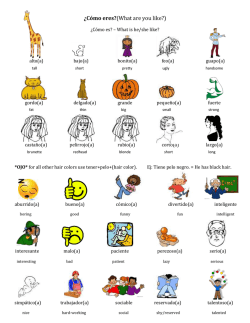
Los Modales: Una Introducción
PROFESORNATIVOGRATIS.COM
Los Modales: Una Introducción
...S
Related
PAST
...ING
...TO
Modals
DO YOU...?
(Video)
You can.. — Can you...?
Significado
be able to*
CAN('t)
Puedo,puedes,puede....
may (not)
COULD(n't)
Podía, podías..../ podría, podrías.../ pudiera, pudieras...
have to*
MUST(n't)
Debo, debes,debe....
ought to
SHOULD(n't)
Debería, deberías, deberíamos...
be going to*
WILL (won't)
Futuro: Iré, vendrás, sabrá....
may (not)
MIGHT (not)
Futuro + tal vez, quizás
Let's*
WOULD(n't)
Condicional: Iría, vendrías, sabría....
SHALL
¿Hacemos tal cosa?
_____________________________________________________________________________________________________________________________
*= Not Modals
1. Can, Could vs. Be able to...
I couldn't run when I was a baby, and I won't be able to swim when I am old.
2. Can I..? vs. Could I..? vs. May I..?
Can I have a coffee and some cake? Could I ask you a question? May I come in?
3. Must vs. Have to...
I must practise my English. You have to tell me how!
4. Mustn't vs. Don't have to...
You don't have to come to work tomorrow if you're ill, but you mustn't be late on Tuesday!
5. Should vs. Ought to...
You ought to eat more fruit and vegetables, and you shouldn't drink coke or fanta.
6. (Be) going to vs. Will or Won't...
I'm going to have an exam on Wednesday. I don't think I will pass it!
7. Will vs. Would...
If it's sunny, I will go to the beach. If it was sunny, I would go to the beach
8. Shall vs. Let's...
Shall I take your coat? Let me take your coat!
Where shall we go? Let's go to the zoo!
profesornativogratis.com
PROFESORNATIVOGRATIS.COM
Los Modales: Una Introducción
Host = Anfitrión
Guest = Húesped / Invitado
Refuse = Rechazar
Wrong = Mal / Equivocado
Careful = Cuidadoso
Gift / Present = Regalo
Die = Morir
Polite = Educado / Cortés
To state = Declarar, Manifestar
(Audio)
Dish = Plato
Bodies = Cuerpos
Look for = Buscar
Unlucky = 'Malsuertudo'
Decompose = Descomponer
Law = Ley
Bottom = Parte de Abajo
Tips = Propinas
On time = A punto
Full = Lleno
Meal = Comida
________________________________________________________________________
Here are some laws and customs from around the world. Listen to my explanation and complete the
sentences with the correct option:
1. In Iran, you DON´T HAVE TO / HAVE TO eat everything on your plate.
2. If you give flowers to your host in China, he or she WILL / MIGHT NOT like it!
3. In Israel, you CAN / SHOULDN´T cook Spaghetti Carbonara for your guests.
4. In Japan, you HAVE TO / SHOULD / SHOULDN'T give tips in a restaurant or bar.
5. An Indian WON'T / COULD give you wrong instructions if you ask for directions.
6. In Longyearbyen you MUST / MUSTN'T / CAN die.
7. In Russia, a guest DOESN'T HAVE TO / SHOULD / SHOULDN´T give a gift.
8. In Denmark, you MUST / CAN look for children under your car, and you MUSTN'T / CAN
escape from prison.
9. In Senegal, you HAVE TO / SHOULDN´T admire the decoration in your host´s house.
10. In Morocco, you HAVE TO / SHOULDN’T open your present immediately.
11. In Ethiopia, you OUGHT TO / DON´T HAVE TO have a drink of coffee if you are offered.
12. In the UK there is a law stating that Aliens WILL HAVE TO / MUSTN'T invade the country,
but if they have a licence, they CAN / SHOULD.
13. In Argentina, you HAVE TO / DON'T HAVE TO arrive on time to a party.
14. In the USA you CAN / SHOULD / MUSTN'T normally use a person's first name in business.
15. In Saudi Arabia women HAVE TO / SHOULDN´T cross their legs when they are sitting.
16. In England you CAN / SHOULD / SHOULDN´T put up two fingers when you meet someone.
17. In Denmark you MUST / MUSTN'T / DON'T HAVE TO pay for your dish in a restaurant.
Sources: http://www.kwintessential.co.uk/resources/country-profiles.html ;
http://www.telegraph.co.uk/travel/picturegalleries/9660868/The-worlds-weirdestlaws.html?frame=2391223
profesornativogratis.com
© Copyright 2026

